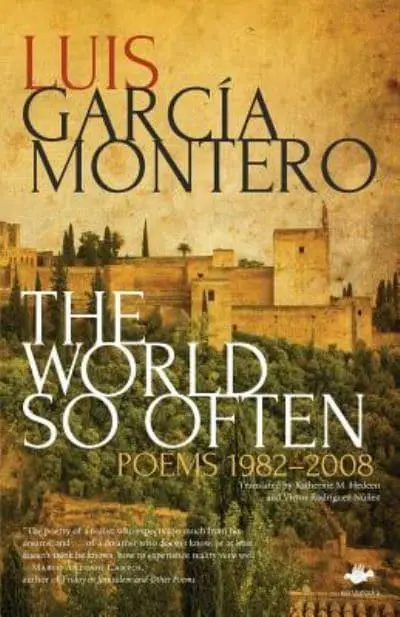The World So Often: Poetry Readings with Luis García Montero and Robert Portal at Oxford Literary Festival.

The World so Often: Poetry Readings with Luis García Montero and Robert Portal.
Friday, 4 April 2025

Distinguished Spanish poet Luis García Montero appeared at this year's Oxford Literary Festival, talking to Luke Kennard of Birmingham University about his anthology entitled (in English translation) The World So Often: Poems, 1982-2008.
Montero is author of 14 collections of poetry and has received many of Spain’s most prestigious prizes including the Adonais Prize, the National Poetry Prize, and the National Critics’ Poetry Award. Montero is a powerful voice in modern Spanish poetry, who has also taken on the task of promoting the Hispanic cultural world in his role as Global Director of the Instituto Cervantes.
Various poems from The World So Often were read in the original by the poet, and then an English translation of each poem was read, very impressively, by the actor Robert Portal.
Señor García Montero’s demeanour is mild and benevolent. His spoken Spanish has a light Andalusian quality, reminding us that, like the legendary Federico García Lorca, he hails from Granada. Born in 1958, Montero came of age just as Spain was emerging from the Franco dictatorship, and entered academia at a time when his country is groping towards democracy. “I felt passionately,” says Montero, “that democracy was not just about turning out to vote every four years. Democracy meant that we could be free to express our individuality – that our individual experience would not be drowned out by prescriptive authoritarian dogma. So historical change can run in parallel with our private life, whenever we say words like “tú” and “te quiero.”
When alluding to his influences, Montero refers to Eliot and Auden, as well as Antonio Machado and Lorca. And there is certainly an element of “the everyday” in his themes and language. But there is also an element of wonder. He is “a realist who expects too much from his dreams” says a contemporary.
Montero himself stresses that his poetry is not “confessional”, not “imposing the poet’s truth on the reader”; rather, it is written in order to create the conditions in which readers “will feel their own truth.”
One poem from the collection, entitled “One Language” starts with a famous quotation from Hernando de Acuña, Un Monarca, un Imperio y una Espada (One monarch, one empire, one sword.)
The English runs:-
I hear a voice, they’re calling me by name
I remember the map of oceans and worlds drawn on my schoolyard,
one puddle, one empire and one sword
during the poor national autumns
getting ruined with the rain
until it felt like earth
Language, as they explained to us
left one world for another,
and returned with voices of legend
I hear the flight of the condor in its syllables.
The wind blows, gathers names and oblivion,
won’t respect kilometre’s sharp edge
… It came across the violet of a far-off corner
so I might live,
on the streets of Borges and Neruda,
between Machado and Juan Ramón Jiménez
The rain, not cutting
but rusting the edges of a sword
also fell on the past,
like learning to talk on forest leaves
I hear a voice
remember those school maps.
More constant than hate or greed
mightier than bitterness or prison
more heroic than an army’s dream
suppler than the sea
are words
Acuña, a poet of the Golden Age, supplies the grandiloquent phrase “one monarch, one empire, one sword”, but García Montero, in a humbler vein, remembers his schooldays in Franco’s Spain, then goes on to develop a meditation on the abiding power of the Spanish language.
I bought the book, “The World So Often”, and am pleased to say that the translations are excellent, but I am a little disappointed that it is not a parallel text. The meaning can be rendered in translation, but not the sound and rhythm, which contribute so much.
Throughout this event my thoughts returned to the theme of overcoming language barriers. Luke Kennard’s introduction and questions were relayed to the poet via an interpreter, and the whole operation was founded on the conviction that the world of a Spanish poet can resonate with an audience in Oxford or London.
G.S.